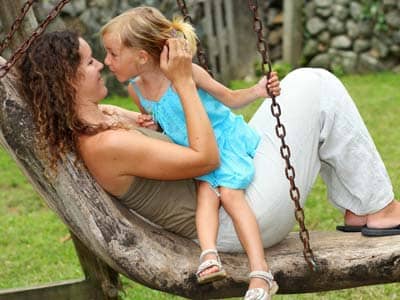How to Raise Responsible Kids
Responsibility means doing what needs to be done to take care of yourself, your family, your friends, and the greater community. Being responsible means that others can rely on you, that you follow through on your promises.
Kids need to learn that acting responsibly might involve doing something difficult--like studying for a test or giving up social plans in favor of helping the family. Responsibility can also take moral strength--such as saying no to drugs. Here are some ways parents can teach their children to act responsibly and do the right thing.
Read the first tip for raising a responsible child.
Be Dependable
Children learn trust from having parents who are trustworthy. When kids are nurtured well and consistently, they develop a sense of basic trust and security. So if you say you’re coming home for dinner, do your best to be there. When you make a promise, try to fulfill it. If unexpected events keep you from following up, explain why honestly and simply. This provides a good model as children learn to take responsibility for their own actions.
Teach Kids Self-Care
Let children start to take responsibility for themselves in small ways, then graduate to bigger ones. For instance, encourage young kids brush their teeth or dress themselves in the morning, even though you can do it faster. Give them self-care tasks like putting their toys away and making their own beds (you could put these on a chart), then compliment them on how responsible they are. They’ll start to see themselves as capable and competent--which leads to a strong self-image and the desire to do more on their own.
Give Kids a Role in the Family
Let kids know that their contribution helps the family. Little by little, give your child chores that he or she is responsible for. Start with easy things, like setting the table and feeding pets. As time goes on, kids can move on to vacuuming a room and doing laundry. They might even help plan a family trip and do internet research on activities and places to stay. Whatever they do, praise children for being responsible and let them know what they do is valued.
Help Them Get Organized
One of the hardest skills to learn is how to balance competing responsibilities. Even adults have trouble with this. Between homework , chores, afterschool sports, and other responsibilities, kids may get overwhelmed or simply forget what they were supposed to do. Teach basic organization skills. For instance, have kids make a “to do” list with due dates and a general idea of how long each task will take.
Make a rule about “homework first, TV after.” Kids need to set daily goals and break long-term projects into chunks. If they get in the habit of checking their “to do” list or calendar each day and looking ahead , it will keep things from falling off their radar.
Be Patient
Hard work and persistence are key elements of responsible behavior. But it takes time for these qualities to grow. Kids need practice so they can build responsible habits, learn from mistakes, and develop a sense of ownership that lets them acknowledge, “Yes, this is my responsibility.” If your child is juggling many responsibilities, take the time to talk them through. He or she might need some specific help or just may need to vent. Learning to delay gratification--meeting obligations even when you’re not in the mood--may be the hardest lesson for kids to learn.
Enlarge Their Scope
As they grow, children start to grasp that they have responsibilities to groups beyond themselves--to their family, school, community, team, and house of worship. Increasingly, they can be asked to take responsibility for others in the family--which may mean walking a younger child to her classroom or babysitting younger siblings when they're mature enough. If they've made a commitment to volunteer for something, take their responsibility seriously and stress your pride in seeing them follow through.
Cope with Irresponsible Behavior
Irresponsible behavior often brings natural consequences--doing a poor job on homework results in a lower grade, parking illegally may cost you a ticket, and so on. In such cases, don’t bail kids out of their responsibilities--insist they make good on the homework or pay for the ticket themselves. Focus on how they can do better next time. If they’ve broken a rule, tell them, “We need to find a way for you to earn back our trust.” Link privileges to responsibilities. For example, if a child wants to go to the mall with friends, he or she needs to finish chores first.
Prepare Them for Independence
One of our most important jobs as parents is to prepare our children to cope with life outside the home. Teach your child basic life skills, such as grocery shopping, cooking, budgeting, and doing laundry, and other household tasks. Start an allowance and help your child budget and save for special items. Allow kids to set their own goals and to take the reins as much as they can. Look for ways to let your kids know that you find them trustworthy. But if they break a rule, tell him, “We need to find a way for you to earn back our trust.”
Make Choices That Build a Better World
Making responsible choices is an important part of mature behavior. Give kids experience in decision-making early on, and let them abide by their choices. But if they cross a moral or ethical line--if they harm property or hurt someone's feelings, for example--ask them how they can make amends rather than impose a punishment. Emphasize how individual responsible behavior builds a better world—that we can’t fix everything ourselves, but when each of us takes care of our environment or helps other people in small ways, the entire community benefits.

